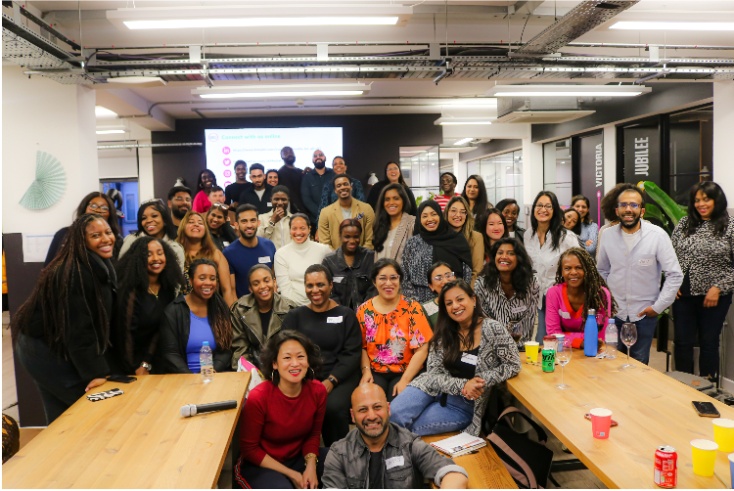DEI is ‘no longer top of the agenda’: Why media needs equitable coaching

Interview: Career Leaders
The media industry still has a problem retaining its diverse talent. But how can equitable coaching help stem the flow of employees wanting to leave?
“The media and advertising industry wants to do more to retain talent and I think they talk the game but if you actually dig into what they are doing to be equitable in supporting those from underrepresented groups, it’s not enough.”
This is what Elaine Dela Cruz, founder of sister companies Coaches of Colour and diversity consultancy Project 23, and previously a digital advertising professional for more than 15 years, told The Media Leader as she explained the importance of equitable coaching and investment, and why the media and advertising industry needs it so badly.
While she says she does not want to “throw shade unnecessarily”, acknowledging progress has been made when it comes to more organisations talking about physical and neurodivergent accessibility and implementing more menopause policies, for example, she says the different needs of Black and Brown people is not being discussed enough.
She says this is because this goes into “uncomfortable conversation territory” and is something that the media and advertising industry is not alone in not talking about enough or fully addressing.
“I think organisations just need to be able to simply and in everyday language acknowledge and accept that inequalities exist. That is our baseline- it is harder for people of colour in the workplace,” she adds.
Dela Cruz sees that typically when most organisations start talking about EDI, DEI or DEIJ, they start with the numbers, “who’s here and who’s not”, and that segues into changing recruitment policy and process to encourage diverse talent to come in.
Media companies have made inroads in this respect, however, they are “slower to the mark” with how to make underrepresented talent feel welcomed and understood in their organisations.
 She explains: “Okay, I’ve now got a higher percentage of Filipino women or Muslim women or Black men. How am I going to make it so that it’s welcoming for them, and show that we understand their lived experience or their barriers? How do we make career development better? How do we improve? How do we tailor L&D for these particular people?
She explains: “Okay, I’ve now got a higher percentage of Filipino women or Muslim women or Black men. How am I going to make it so that it’s welcoming for them, and show that we understand their lived experience or their barriers? How do we make career development better? How do we improve? How do we tailor L&D for these particular people?
“But, instead, they’re just coming in and they’re just receiving what everyone else received which is for this homogenous white middle-class men. There’s going to be a drop-off because the culture hasn’t yet caught up with being able to support greater diversity in its workforce.”
Nikki Sehgal, general manager at Media For All (Mefa), echoed this as she highlighted the latest All In Census figures finding 30% of Black employees were likely to leave the industry because of a lack of inclusion or discrimination. This stood at 21% respectively for Asian talent and any minority ethnic group, 14% for Mixed, and 7% for White.
This decrease of between two and six percentage points compared to the 2021 survey is still not good enough, Sehgal stresses.  She adds that many dedicated Equity Diversity and Inclusion (EDI) roles that were created in May 2020 amid the Black Lives Matter movement and Floyd’s murder, are now being cut and not refilled. This, she warns, shows EDI is “no longer top of the agenda”.
She adds that many dedicated Equity Diversity and Inclusion (EDI) roles that were created in May 2020 amid the Black Lives Matter movement and Floyd’s murder, are now being cut and not refilled. This, she warns, shows EDI is “no longer top of the agenda”.
This is why both Dela Cruz and Sehgal organised a two-hour equitable coaching session for 44 Mefa members entitled “Setting Ourselves Up To Thrive”, which was also in line with Mefa members’ requests in their annual survey for more community-based initiatives, professional development and safe spaces where they could speak openly about their experiences in the industry.
Six accredited coaches Dela Cruz, Gary Rayneau, Anouchka Burton, Arif Bobat, Shez Iqbal and Trudy Lewis delivered the sessions centred on “Personal Value” and “Personal Branding”, things that Sehgal thinks is particularly relevant for minorities in media and advertising.
“Minorities really struggle with that and how to show up in a place without feeling inferior, “she says. “Everyone has impostor syndrome to some degree but, when you’re in rooms with ethnic minorities, I feel like they are a lot more honest about that and they can almost show up as their true selves. We talk about ‘coming to work and showing up as your true self’ but that’s not a reality for a lot of people from those demographics.”
Coaching should be for everyone
Typically the content of an equitable coaching session may not look too different to what one might expect; discussing top career topics everyone would find value in like knowing your strengths, building a network of professionals, prioritising a work-life balance and wellbeing, Dela Cruz says.
The “nuance” in equitable coaching comes in people coming together and hearing others having a similar experience.
Dela Cruz adds: “The different lived experience of marginalised groups mean that how they navigate the workplace is different. So the headline is the same, the destination is the same, but the getting there is what comes in the magic of coming together.”
She clarifies that coaches do not come into sessions talking about race or ethnicity every time; the subject is “in the background” until clients choose to raise it for discussion. Dela Cruz also insists that equitable coaching does not need to be expensive, or the reserve of senior leadership. In fact, it should be a case of “the earlier the better” in order to give people more ownership of their careers and the ability to make more informed decisions.
Dela Cruz founded Coaches of Colour in 2022, partly after finding there was a lack of cultural awareness in therapy, and party after “hitting a ceiling” in digital advertising and the infamous 2020 murder of George Floyd leading more people of colour to need support from others like them.
The aim of the organisation is to provide Black and Brown people with access to professional coaches of colour and to “disrupt” the coaching industry which has historically been very privileged. There has been a lack of accessibility, she explains, for diverse people being able to qualify as coaches or receive coaching themselves. Having qualified as a coach in 2018, she realised she was ‘codeswitching’ in the coaching environment to sound more highbrow and academic.
As a result, Coaches of Colour donates 10p of every pound to a non-profit called The Equitable Coaching Foundation to build up a bursary to offer coaching or coaching training to underprivileged people from a disability, ethnicity or social mobility perspective.
Employees are ‘hungry’ for investment in their careers
“Coaches of Colour is unapologetic in the fact we’re seeing equitable investment in people as really important,” Dela Cruz says.
Dela Cruz sees this kind of coaching as an example of this, which is something employees are “hungry” for at the moment, especially in the context of the Great Resignation and for those that are “burnt out” from working on a voluntary basis on Employee Resource Groups (ERGs).
The impact and value of equitable coaching on both employees and businesses is “huge” as it helps individuals feel energised, engaged, empowered, able to work through challenges creatively and encourages them to stay in industry, while organisations retain diverse, capable and ambitious staff.
It can also help with feelings of isolation, which is quite common as people become more senior and there are fewer people to confide in and safe spaces to go to to express the stress and anxiety one might be feeling.
“Coaching is amazing. Everyone should have access to coaching and we should feel safe, be able to be vulnerable and have someone on the other side having some idea of my experience,” Dela Cruz affirms. “I can coach another Filipino woman, but that doesn’t mean I know her life, but I might have some idea, or I might just believe her and not challenge her on things that I assume to be right.”
Sehgal says of the coaching experience: “It can be really empowering and help with resilience because I think ethnic minorities have obstacles and systemic barriers in getting to those leadership positions or progressing within the industry. I think this partnership was brilliant and necessary.”
She adds that it validates people’s experiences, provides relevant support in a safe space, fosters a sense of community, and helps with leadership and decision-making skills.
Coaches that have different cultural understandings, backgrounds and specialisms offered strategies which were relevant to their cultural context and lived experiences where there would not necessarily be the opportunity if it was a homogenous group coaching session internally, Sehgal says.
“There’s a huge issue with retention and churn within the industry- again it’s lack of representation, a lack of visibility, a lack of ethnic minorities in those senior roles, and then not having the provisions or the support to actually reach that destination which is where this concept [of equitable coaching] comes in which is the work that will help get that get that individual to that place.”
Mefa plans to continue these coaching sessions for between 40 and 50 members every quarter.




